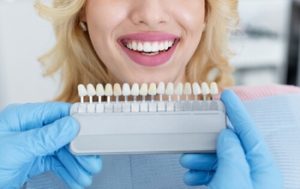Teeth whitening is a celebrated cosmetic dental procedure that many people consider to enhance their smiles. Whether through professional treatments or over-the-counter products, the desire for a whiter smile has led to a growing industry of whitening products. However, does teeth whitening damage teeth?
This article explores how teeth whitening works, its effects on tooth enamel, and whether it can harm your teeth or gums.
By the end, you’ll have a clear understanding of the risks involved, the best whitening options available, and how to maintain a radiant smile.
How Does Teeth Whitening Work?

One of the most common active ingredients in whitening treatments is hydrogen peroxide. When applied to the teeth, it gets through the enamel to lift stains caused by food, drinks, smoking, and the natural ageing process.
By targeting deep-set stains and surface discolouration, these whitening agents can help you achieve a noticeably brighter smile. However, the effectiveness of the treatment depends on the type of whitening product used and how well it is done.
Types Of Teeth Whitening Treatments
If you’re considering teeth whitening, there are several options available, each with its own benefits. Choosing a treatment option depends on your goals, lifestyle, and sensitivity levels.
Below, we explore the three main types of whitening processes so you can make an informed decision.
1. Professional Teeth Whitening At A Dental Clinic
A professional teeth whitening procedure is performed by a qualified dental professional in a controlled setting. This method is ideal if you’re looking for fast, noticeable results with the added reassurance of expert supervision.
- A high concentration of hydrogen peroxide is used to break down stains and illuminate your teeth.
- The procedure is carefully monitored to minimise tooth sensitivity and protect your gums.
- Many treatments incorporate advanced laser light technology to accelerate the whitening process.
- You can typically see results in as fast as an hour, making it a popular choice for those wanting immediate improvement.
Since professional whitening is tailored to your needs, your dentist can refine the treatment to achieve the best possible outcome while ensuring your oral health remains a priority.
2. Take-Home Whitening Kits From A Dentist
If you prefer a more gradual approach to whitening, a custom take-home whitening kit from your dentist may be a great option.
These kits allow you to whiten your teeth in the comfort of your own home while still benefiting from a professional-grade whitening solution.
- Your dentist will provide you with bespoke whitening trays designed to fit your teeth precisely for even coverage.
- The whitening gel contains a milder concentration of bleaching agent, reducing the likelihood of sensitivity.
- Treatment usually takes a few weeks, with visible improvements occurring gradually over time.
- Since the trays are custom-made, they help prevent the gel from leaking onto your gums, which can sometimes cause gum sensitivity.
Take-home whitening kits are an excellent choice if you prefer a more subtle, controlled whitening process or if you have sensitive teeth and need a gentler option.
3. Over-The-Counter Teeth Whitening Products
Over-the-counter whitening products offer a budget-friendly approach to teeth whitening.
These products contain lower concentrations of whitening materials than professional treatments, making them suitable for mild surface stains.
Common OTC whitening products include:
- Whitening Toothpaste: Formulated with gentle abrasives and small amounts of peroxide to gradually remove stains from the surface of your teeth
- Whitening Strips: Thin strips with a whitening gel that sticks to your teeth for a set period
- Whitening Trays: Pre-filled trays designed to fit most mouths, containing a mild bleaching agent to help lift stains
While these products can help whiten teeth over time, the results may take longer to achieve, and the whitening effect may not be as dramatic as that of professional treatments.
Additionally, because these products are one-size-fits-all, they may not always provide even coverage or prevent gum irritation.
Which Whitening Treatment Is Right For You?
When choosing a whitening method, it’s important to consider factors such as your level of staining, tooth sensitivity, and the speed at which you want results.
If you’re unsure which option is best, consulting a dental professional can help you identify the most effective approach for your smile.
 Does Teeth Whitening Damage Teeth?
Does Teeth Whitening Damage Teeth?
Tooth enamel is the protective layer of your teeth. Many people worry that whitening treatments could weaken or wear down enamel. However, when used correctly, teeth whitening should not cause permanent enamel damage.
Hydrogen peroxide works by breaking down stains, not by removing layers of enamel. However, improper use or overuse of whitening agents may increase the risk of enamel damage.
Keeping Your Teeth Bright After Whitening
To keep your teeth looking bright after whitening, it’s important to follow a strong oral care routine. Here are some simple but effective ways to prolong your results:
- Brush And Floss Daily: Removing plaque and food particles helps prevent new stains from forming and keeps your smile fresh.
- Visit Your Dentist Regularly: Routine dental check-ups and professional cleanings can help maintain your results and ensure your teeth stay in optimal condition.
- Be Mindful Of Stain-Causing Foods And Drinks: Beverages like coffee, tea, and red wine can contribute to discolouration over time. Rinsing your mouth with water after consuming them can help reduce staining.
- Use A Whitening Toothpaste: A dentist-approved whitening toothpaste can help prevent surface stains and keep your smile looking its best.
By following these steps, you can enjoy your whiter smile for longer while keeping your teeth and gums healthy.
Frequently Asked Questions
Does teeth whitening cause sensitivity?
One of the most common side effects of teeth whitening is temporary tooth sensitivity. Some people develop temporary sensitivity because bleaching agents can penetrate the enamel and reach the underlying dentin, which houses tiny nerve endings.
Can whitening damage your gums?
If whitening gels come into contact with the gums, they may cause temporary gum sensitivity or irritation. This is why professional teeth whitening treatments use protective barriers to shield the gums.
How long do whitening results last?
The longevity of results depends on diet, oral care habits, and whether you smoke. Professional whitening treatments typically last longer than over-the-counter products.
Does whitening damage fillings or crowns?
No, but it also does not change their colour. If you have existing dental work, discuss achieving a uniform shade with your dentist.
Conclusion: Achieve A Brighter Smile
So, does teeth whitening damage teeth? When done correctly, teeth whitening is a great way to enhance your smile. While temporary sensitivity and gum irritation are possible, following proper guidelines and seeking professional advice can help you achieve whiter teeth without harm.

If you’re considering teeth whitening and want a world-class treatment, our experienced dental professionals are here in Dubbo to help.
Whether you’re looking for in-chair whitening for immediate results or a take-home whitening kit for a more gradual approach, we can guide you towards the best option for your smile.
Contact Advanced Dental Care today at (02) 6188 7103 to discuss your whitening goals, get expert advice, and ensure your oral health remains a priority throughout the process. Let’s create a smile you feel truly confident about!
Disclaimer: Any surgical or invasive procedure carries risks. Before proceeding, you should seek a second opinion from an appropriately qualified health practitioner.
Sources
Watson K. How Does Teeth Whitening Work? [Internet]. Healthline. 2022 [cited 2025 Feb 21]. Available from: https://www.healthline.com/health/how-does-teeth-whitening-work
Gillespie C. Does Hydrogen Peroxide Whiten Teeth—and Is It Safe? [Internet]. Health. 2023 [cited 2025 Feb 21]. Available from: https://www.health.com/condition/oral-health/is-it-safe-to-use-hydrogen-peroxide-to-whiten-teeth
Watson S. What to Expect from Professional Teeth Whitening [Internet]. Verywell Health. 2024 [cited 2025 Feb 21]. Available from: https://www.verywellhealth.com/how-is-professional-in-office-teeth-whitening-done-1059032
WebMD Editorial Contributors. Tooth Discoloration [Internet]. WebMD. 2023 [cited 2025 Feb 21]. Available from: https://www.webmd.com/oral-health/tooth-discoloration


 Does Teeth Whitening Damage Teeth?
Does Teeth Whitening Damage Teeth?




